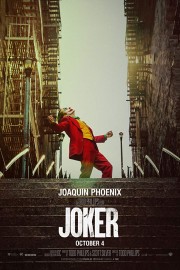Joker
Considering the direction a lot of pre-release chatter took the discussion for Todd Phillips’s “Joker,” it feels like far more significant themes and ideas, which are more troubling to put in a film for mass consumption, are perpetuated by this film in its attempt to take the Clown Prince of Gotham’s story, and turn it into a serious drama.
The first thing people will invariably point to in this film is how Phillips and his co-writer, Scott Silver, have basically turned this Joker narrative into a comic book variation of two Martin Scorsese films, “Taxi Driver” and “The King of Comedy,” with both films’s star, Robert DeNiro, completing the “homage” as this film’s late night host, Murray Franklin, whom Arthur Fleck, Joaquin Phoenix’s Joker-to-be, idolizes from a far. I will give them this, they don’t make beat-for-beat references to those films, but use them as a template of the type of “disturbed loner” they depict Fleck here as the wannabe comedian gets beaten down by his menial job as a rent-a-clown, and takes care of his mother (Frances Conroy). It’s an effective way of writing the character in a film that separates him from Batman, and is an intriguing character study of what type of individual would affect the look of a clown to fit their sociopathic effect on society. That said, there are issues I have with the way this film goes about its business, and I’m going to have to dive into spoilers to do so.
Arthur Fleck is clearly mentally disturbed when we meet him. His laugh, which can happen at inappropriate times (and actually results in a key moment of violence in the film), is a result of a mental condition he’s lived with for years. He is going to state-funded mental health facilities where the counselors only seem to do the bare minimum in terms of helping their patients, and- if funding is cut- leave the patient hung out to dry to fend for themselves. He and his mother live in poverty, in a run down part of Gotham, that is primed for violence against the 1% like Thomas Wayne (Brett Cullen), whom is looking to run for mayor, and whom Arthur’s mother worked for about 30 years before. The system is designed to ignore the needs of people like Arthur and his mother, and there’s some cutting social commentary in this film about how society fails those most in need, especially those who have mental health issues.
That also opens up a can of worms I found troubling about “Joker.” I’m someone who’s dealt with stress, anxiety and depression for my adult life; I’ve even had brief moments of suicidal ideation, though I have gotten myself out of them not long after having them, without resorting to self-harm. I know my issues pale in comparison to someone like Arthur’s, though, and unchecked, the results can be debilitating, and make life almost too much to take for someone with more serious mental issues than mine. Years of therapy and medication are often what life has in store for the Arthur Flecks of the world, and, if they don’t have great financial resources, the process will be filled with fits and spurts and bad treatment. Starting at a place where someone who becomes the Joker is mentally disturbed, however, perpetuates a stigma against people who suffer from mental illness that comes into the discussion whenever a white person commits a mass shooting in America. The assumption is that the (usually) “lone gunman” in these shootings was mentally disturbed, even though studies show that people who suffer from mental illness are more likely to be the victims of violence than the perpetrators of it. To its credit, we see glimpses of that in “Joker,” as well, when it comes to some painful truths about Arthur and his mother’s past being revealed, but they don’t carry quite the same weight as the idea that Arthur is already disturbed, and society tips him over the edge towards violence. It’s ironic, then, that his first edging towards violence is accidental, when- in another irony, given the way a lot of people thought “Joker” might go pre-release- Arthur has a laughing fit as three white collar douchebags harass a young woman on the subway, berating her for not recognizing one of them as “trying to be nice to her.” Part of the problem is how that turns violent, and how it inspires actions in society, feel out of sync, without a real focus on what the real aftermath of that would look like for Arthur in his life and worldview. It’s a big swing for Phillips, but one he isn’t enough of a filmmaker to pull off successfully, especially considering how thematically he’s painting Arthur’s evolution into Joker.
This is a bold move towards more “serious” filmmaking for the director of “The Hangover” movies, “Old School” and “Road Trip.” He has a strong vision for his film, which reverberates in the production design by Mark Friedberg, the cinematography by Lawrence Sher, and unnerving score by Hildur Guonadottir, but he also doesn’t have a lot of urgency in telling his story, resulting in a lot of slow parts until the last third of the movie, when Fleck begins to move into the persona he’s destined to go in here. It’s not Phoenix’s best work as a lonely guy with issues (though to reduce his great work in “Her,” “The Master” and “You Were Never Really Here” to just that idea is a disservice), but he creates a memorable portrait of an impoverished human being whose worldview has been skewed by both nature and nurture to be something it’s not, and his scenes with DeNiro, Conroy and Zazie Beetz as a neighbor in his apartment complex, have different energies and strengths to them that add to the whole effect of Phoenix’s performance, and Phillips’s movie, even if the latter has some dangerous thoughts on its mind.










